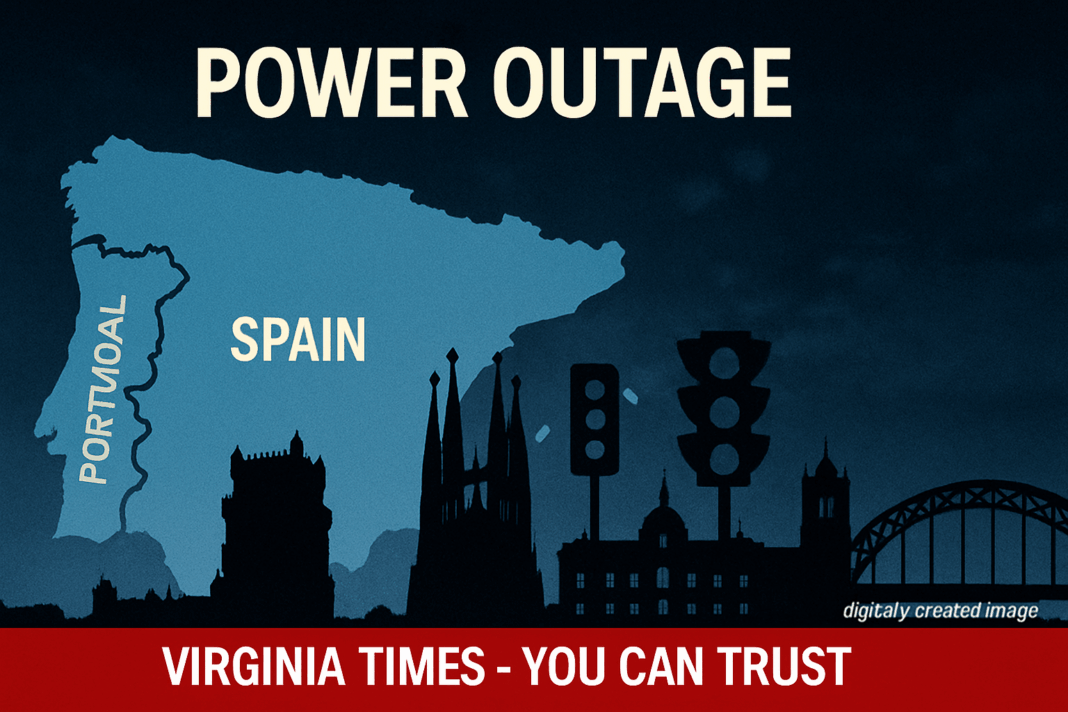A sweeping power outage brought much of Portugal and Spain to a halt on Monday, shutting down transportation networks, disrupting businesses, and leaving millions without electricity across the Iberian Peninsula.
The blackout began around midday, according to live coverage by EuroNews. Office buildings closed, subways stopped running, and traffic lights failed in major cities like Madrid, Lisbon, Barcelona, and Porto. In Barcelona, civilians were seen directing traffic at intersections, EuroNews reported.
Cause of the Blackout
According to live statements broadcast by RTP and TVE, the power outage was caused by anomalous oscillations in the high-voltage transmission lines, likely triggered by sudden temperature shifts over central Spain.
Both Red Eléctrica de España and REN Portugal explained that the grid disruption led to the automatic disconnection of the Iberian Peninsula from the larger European electricity network.
“There is no evidence of a cyberattack,”
clarified a REN spokesperson during a live interview on RTP, emphasizing the purely technical nature of the failure (official REN statement).
“Spain suffered a very strong oscillation that collapsed our grid system,”
a Red Eléctrica official added during a news bulletin on TVE (official Red Eléctrica update).
Transportation Chaos
Train services were entirely suspended across mainland Spain. According to a statement by Spain’s Transportation Minister Óscar Puente, posted on X and aired on TVE:
“Rail transport across peninsular Spain, including commuter (Cercanías), medium-distance, and long-distance trains, is suspended until further notice. No train departures or arrivals are possible due to electrical failures impacting command and signaling systems.”
Minister Puente further confirmed:
- No trains will restart service Monday, even if power is restored later.
- Subway systems in Madrid, Barcelona, and Lisbon were fully shut down.
- 116 trains were stranded when the blackout began; as of 6:30 p.m., 26 trains remained to be evacuated.
- Major rail hubs such as Madrid Atocha, Barcelona Sants, and Seville Santa Justa were kept open through the night to assist stranded passengers.
Regarding other modes of transport:
- Road transport was recommended only for essential travel.
- Airports and ports in the Balearic Islands and Canary Islands were operating normally, using backup generators.
- Air traffic control was operating under preventive restrictions, with 20% to 50% reductions in flight capacity in some areas, to prioritize safe landings.
Government Responses and European Support
Spanish Prime Minister Pedro Sánchez and Portuguese Prime Minister Luís Montenegro activated national emergency protocols. In televised addresses via TVE and RTP, both leaders reassured citizens that restoring power was their top priority.
European Commission President Ursula von der Leyen announced that the European Commission is actively supporting the effort. In a statement posted on X and broadcast on EuroNews:
“I reaffirmed the European Commission’s support in monitoring the situation with national and European authorities and our Electricity Coordination Group. We will coordinate efforts to help restore the electricity system and reassure citizens because energy security is crucial for the EU.”
Von der Leyen also spoke separately with both Prime Minister Sánchez and Prime Minister Montenegro to express solidarity.
Restoration Efforts Underway
According to Red Eléctrica updates shared during evening newscasts on TVE:
- About 45% of Spain’s substations were reconnected by late afternoon.
- Critical services — hospitals, airports, and water facilities — were prioritized for power restoration.
- Full normalization of the electrical grid could take several more days, especially for rural areas.
Portugal’s grid operator REN echoed similar assessments on RTP, warning that while major cities like Lisbon and Porto would regain partial power quickly, full stabilization might take longer.
Monday’s blackout exposed vulnerabilities in the Iberian Peninsula’s power system and its connection to the European grid.
A global media for the latest news, entertainment, music fashion, and more.















